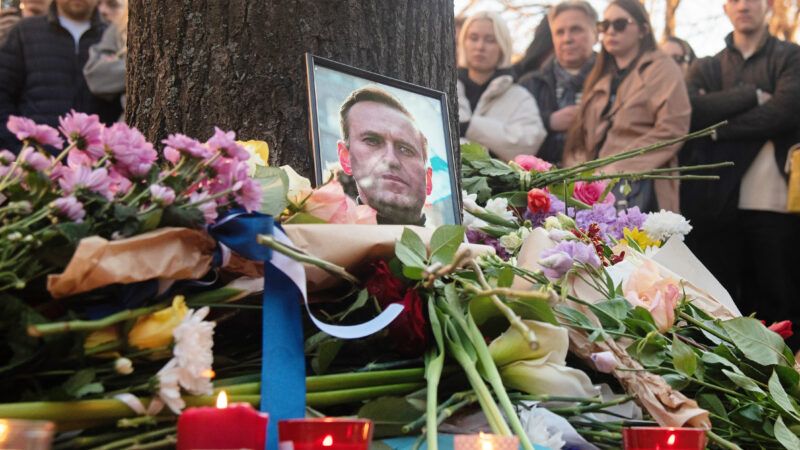Alexei Navalny's Death Is a Timely Reminder of How Much Russia Sucks
And, sadly, of how relatively powerless the United States is to fix the mess that Russian President Vladimir Putin has made.

If there is the thinnest bit of a silver lining to be found in the untimely demise of Alexei Navalny, the Russian opposition leader who reportedly died this week in prison, perhaps it is this: It is a well-timed reminder of how much Russia sucks.
Most Americans probably don't need the reminder. After all, Russia has been an authoritarian state for as long as any American alive today can remember, and Russian President Vladimir Putin's record of murdering political opponents, imprisoning critics, and silencing dissent is well established. Also, there's that foolish, destructive war in Ukraine.
This week, however, the internet has been treated to the absurd spectacle of former Fox News pundit Tucker Carlson's bizarre propaganda tour of Moscow (on the heels of his more defensible decision to interview Putin). Via videos posted to X, formerly Twitter, Carlson raved about the beauty of the Moscow subway system and was wowed by the stunning technology of…shopping carts? Through it all, Carlson has repeatedly suggested that maybe Russia isn't such bad a place, as if a lack of subway graffiti were the most important metric for measuring the quality of a country.
Navalny's death, at the age of 47, says far more about Russia than any of Carlson's puff pieces ever could.
And his death is only the latest development in a damning saga that should indict both Putin and the kleptocratic state that he's built since taking over as Russia's leader-for-life over 20 years. Since bursting onto the scene by leading protests in the wake of a corrupt election in 2011, Navalny had been repeatedly arrested, convicted, and released from prison. In 2020, he nearly died after being poisoned and falling into a coma. In 2021, he was arrested for the last time and ultimately sentenced to over 30 years in prison after what Amnesty International called a "sham" trial.
"Make no mistake: Putin is responsible for Navalny's death," President Joe Biden said Friday. "We don't know exactly what happened, but there's no doubt that the death of Navalny was the consequence of something Putin and his thugs did."
Oftentimes, the news of the day requires context and analysis. There's deeper meaning to be drawn out of events and few clearly obvious conclusions. Sometimes, though, it's pretty straightforward: Russia sucks, and Putin's totalitarian impulses are big part of the reason why. You do not, under any circumstances, gotta hand it to him.
Even so, any silver lining here is exceedingly thin, because it doesn't take long for a deeper reality to become apparent: That the United States, for all its military and economic might, can't do much to fix the mess that Putin has made in Russia.
Just moments after condemning Putin for Navalny's death, for example, Biden was asked by a reporter at the White House how the United States would respond. For context, keep in mind that Biden previously promised "devastating" consequences for Russia if Navalny died in prison.
On Friday, Biden seemed to back away from that idea, incidentally illustrating how powerless America is to influence what happens next inside Russia. "We're contemplating what else can be done," he said. "We're looking at a whole number of options."
As Noah Rothman points out at National Review, there isn't much Biden can do: "As recently as December, the administration tightened the sanctions regime around Moscow by applying additional leverage on third parties 'supplying goods or processing transactions that materially support Russia's military-industrial base.' Perhaps the administration could augment efforts to police restrictions on foreign financial transactions involving Russian funds and impose additional costs on institutions that try to circumvent U.S. sanctions," he writes. Alternatively, "the president could employ additional measures along with its allies to imperil Russia's Black Sea fleet and, in concert with Turkey, menace Russian forces in Syria. But those are riskier propositions."
It probably makes more sense to focus on helping the Russian civilians who want to or already have managed to escape Putin's grasp. There's not much America can do to influence Russian domestic affairs, but welcoming those who desire freedom—rather than subjecting them to detention or long waits in the purgatory of the American immigration system—should be a no-brainer.
As an added benefit, nothing disproves nonsensical narratives like the ones Carlson is peddling like the fact that people are fleeing Russia by droves while there are long lines of people waiting to enter the United States.
Still, Navalny's death stings because it seems like a serious blow to the frail hope that Russia will ever take even the smallest of steps toward freedom and democracy. Change has to come from within, but he represented the best (if obviously imperfect) chance for that to happen—and now he's dead, killed by the political system he stood against.
That sucks. And it sucks that there's not much we can do about it.


Show Comments (182)